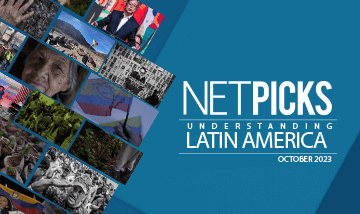Índice
- BOLSONARO GAVE BRAZIL’S ARMY NEW POWERS. THE GENERALS WON’T GIVE THEM UP EASILY
- NEW HONDURAN LEADER LOSES GRIP ON CONGRESS, SAPPING HOPE FOR CHANGE
- IS GUSTAVO PETRO LEAVING BEHIND COLOMBIAN PROGRESSIVES?
- AFTER MAKING GREEN PLEDGES, ECUADOR PLANS TO EXPAND OIL ON INDIGENOUS LANDS
- CHILE’S PRESIDENT-ELECT NAMES PROGRESSIVE, MAJORITY-WOMEN CABINET
Understanding Latin America
Dear readers and colleagues, this month we bring you six articles that reflect the reality of Latin America: one each from Brazil, Venezuela, Honduras, Colombia, Ecuador and Chile.
- Bolsonaro gave Brazil’s army new powers. The generals won’t give them up easily
- Why the opposition win in Barinas, Venezuela, matters
- New Honduran leader loses grip on congress, sapping hope for change
- Is Gustavo Petro leaving behind Colombian progressives?
- After making green pledges, Ecuador plans to expand oil production on indigenous lands
- Chile’s President-elect names progressive, majority-women cabinet
.
BOLSONARO GAVE BRAZIL’S ARMY NEW POWERS. THE GENERALS WON’T GIVE THEM UP EASILY
Under President Jair Bolsonaro, the Brazilian military has enjoyed greater power than at any time since the end of the dictatorship in 1985. A former Captain, Bolsonaro was looked down on by military leaders due to his notorious acts of insubordination. But by 2014, the situation had changed, and a power play was under way that would lead to his election in 2018. Once elected, Bolsonaro appointed thousands of active-duty and military reserve officers to important civilian posts, in the process handing over responsibility for large swaths of the federal budget and control over the government. And though Bolsonaro is still not highly regarded, the military has used the opportunity he gave them as a way to reclaim political power; managing at the same time to avoid public resentment despite some having been heavily involved in the administration’s most brazen corruption schemes and anti-democratic actions. Most have avoided prosecution, likely due to threats to Congress and members of the media. And while the October 2022 presidential elections may change the situation for Bolsonaro and his military allies, the latter are taking steps to ensure their newfound power will remain in place no matter who becomes the President. “They are making the political calculations to try to remain in important positions of power or at least negotiate on the best possible terms.” says one analyst. Another, Piero Leirner, believes that given the military’s recent and extensive access to power: “They have collected a vast amount of information that can compromise almost everyone in politics.”
Andrew Fishman, January 10th, 2022.
https://theintercept.com/2022/01/10/brazil-military-power-jair-bolsonaro/
.
WHY THE OPPOSITION WIN IN BARINAS, VENEZUELA MATTERS
Barinas, a state in the south east of Venezuela, may be small in size, but to the Maduro government it represents the “cradle of the revolution.” Barinas is the birthplace of President Hugo Chávez, and has been dominated by the Chavez family; his father and brothers holding the office of governor for the past 22 years. The victory of opposition candidate Sergio Garrido in the Barinas governorship race consequently has symbolic importance, despite the fact that in the November regional elections the governing Chavistas won 19 of 23 governorships and 210 of 335 mayoralty races. What Barinas signifies is a change in the way the opposition and the government view their future electoral possibilities. The defeat, says the author, “has revealed the erosion of the main tactics the government has relied on, both in the recent regional elections and in the 2020 parliamentary elections: high abstention, a divided opposition, and its own political-electoral machinery.” Expectations regarding the 2024 presidential elections have consequently changed. The radical opposition was also a loser in Barinas, as Garrido’s electoral victory has undermined the promotion of radical options such as a coup and foreign intervention; strategies that have continually failed. What remains to be seen is whether Washington will limit a process of institutional normalization by maintaining its antagonistic position, thus ensuring that the government remains entrenched.
Ociel Alí López, January 24th, 2022.
https://nacla.org/why-opposition-win-barinas-matters
.
NEW HONDURAN LEADER LOSES GRIP ON CONGRESS, SAPPING HOPE FOR CHANGE
Xiomara Castro, Honduras’ first female president, was elected on the promise of restoring democracy, and tackling the corruption and organized crime that are the scourge of her country. However, Castro has already suffered a major setback. A rebellion within her leftist ‘Libre’ party has deprived her of control of the Honduran Congress and, at least in the short term, compromised her ability to meet her campaign promises. A group of 22 Libre lawmakers allied themselves with the country’s traditional parties, making it far more difficult for Castro to, amongst other things, bring back international anticorruption investigators and loosen the country’s abortion laws. Her overwhelming electoral victory had made her the US most promising potential partner in the region, despite the anti-imperialist tendencies of many in her party. The visit of US Vice President Kamal Harris will therefore be key in shoring up Castro and her administration; from the US perspective, failure of Castro to implement change will not only affect the stability of the region but also lead to more Hondurans leaving the country and heading North.
Anatoly Kurmanaev, January 21st, 2022.
https://www.nytimes.com/2022/01/21/world/americas/honduras-castro-congress-rebellion.html
.
IS GUSTAVO PETRO LEAVING BEHIND COLOMBIAN PROGRESSIVES?
In the 2018 Colombian presidential elections leftist Gustavo Petro and his Vice-Presidential candidate, gender equality advocate Ángela María Robledo, polled 8 million votes in the second round. Petro’s platform was the only one to promote progressive priorities such as eliminating sales tax on feminine hygiene products, supporting the LGBTQ community, and phasing out Colombia’s reliance on oil and gas. The pair didn’t win, but they did give hope to Petro’s many supporters that his time might come in 2022. It may have. However, although Petro will almost certainly be his ‘Historic Pact’s’ candidate to face center and right-wing candidates in May’s Presidential elections, for many Petro is no longer the candidate of progressive voters. Despite leading the polls with more than 40% of the vote, and with right wing candidates lagging behind, Petro has been making efforts to broaden his base. But accommodating former allies of ex-President Alvaro Uribe, embracing Christian leaders, and softening his stance on abortion, has not sat well with many, and led one important feminist and a former ally, to call him an ‘authoritarian who promotes fanaticism amongst followers’. The problem for progressives is that unless a real challenger emerges from the centrist ‘Coalition of Hope’, there will be no other candidate to vote for.
Mariana Palau, January 10th, 2022.
https://www.americasquarterly.org/article/is-gustavo-petro-leaving-behind-colombian-progressives/
.
AFTER MAKING GREEN PLEDGES, ECUADOR PLANS TO EXPAND OIL ON INDIGENOUS LANDS
The government of President Guillermo Lasso took office in May 2021, and in its initial phase appeared to show a positive attitude towards protecting the environment. After decades of extractive projects in the Amazon rainforest, the government created the Secretariat of Peoples and Nationalities of Ecuador, and on World Environment Day announced that Ecuador would be the first country in Latin America to develop a national policy on the ‘ecological transition’. However, Lasso then appointed Juan Carlos Bermeo, a former executive of state oil company Petroamazonas, as Energy Minister. And in a subsequent move, issued a decree on July 7, establishing the country’s hydrocarbon policy, which stipulated that the country would increase oil extraction projects and expand the country’s ‘oil frontier’ in the Amazon region. According to the new policy, the state oil company Petroecuador must increase production from 493,000 to a million barrels of oil per day (bdp). The government has stated that part of the income proceeds will finance child nutrition and development programs in areas influenced by these projects. However, many of the planned projects are located within indigenous territories, and as history, and this article details, shows that agreements with indigenous groups are not always honored, while many compensation agreements amount to little more than an exchange of trinkets for oil.
Gabriela Ruiz Agila, December 20th, 2021.
https://www.planv.com.ec/after-making-green-pledges-ecuador-plans-expand-oil-indigenous-lands
.
CHILE’S PRESIDENT-ELECT NAMES PROGRESSIVE, MAJORITY-WOMEN CABINET
Thirty five year old Gabriel Boric, who will assume the office of President of Chile in March of this year, has named what is a first for Latin America: a ministerial team dominated by women. Fourteen women and 10 men – with an average age of 49 – were named as part of a cabinet combining experienced moderates with former leaders of the 2011 education protest movement. Most notable is the appointment of Maya Fernandez as Chile’s new defence minister; Fernández, a granddaughter of socialist president Salvador Allende, deposed in Pinochet’s bloody 1973 coup d’état, will preside over long-overdue reforms of the military. Two prominent former student protest leaders were also named: Giorgio Jackson, 34, Boric’s political campaign adviser, as secretary general, and Camila Vallejo, 33, Communist party politician who preceded Boric as leader of the University of Chile’s student union. Vallejo will be the government spokesperson. Finance, on the other hand, will be managed by former Socialist party politician and current central bank chief Mario Marcel, a 62-year-old educated at the University of Cambridge.
John Bartlett, January 21st, 2022.
https://www.theguardian.com/world/2022/jan/21/chile-gabriel-boric-cabinet-majority-women





